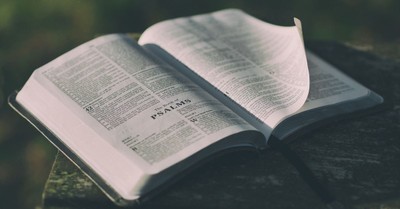Don't Grow Weary of Doing Good amid the Bad News

The first round of debates among twenty of the Democratic Party’s candidates for president is over. As today’s Wall Street Journal notes, Joe Biden was the focus of much of last night’s debate as the candidates sparred over “the role of government in health care and other issues.”
In other news, the United Methodist Church appears to be moving closer to a formal splitfour months after the denomination strengthened its ban on LGBT clergy and same-sex weddings. The House Committee on Education and Labor discussed this week whether religious freedoms should be curtailed with regard to sexual freedom and other “civil rights.”
And San Diego, known as one of America’s most beautiful cities, is also making news because of a Department of Justice study estimating that its underground sex trafficking economy exceeds $800 million a year.
“Let us not grow weary of doing good.”
I would like to offer you some really good news today. But to get there, we need to discuss the bad news.
Political vitriol, sexual immorality, threats to our religious freedoms, and the escalation of sex trafficking are just some of the challenges we face today. If you’re like me, reading the news can be discouraging on two levels.
One: Our culture’s incessantly immoral trajectory can drag us along with it.
Every morning renews the steady drumbeat for “reproductive freedom” or “marriage equality” or “death with dignity.” (Have you noticed that those who champion such unbiblical positions are exceptionally good at rhetorical reframing?)
Since much of the media is demonstrably more liberal than most Americans, we should not be surprised when media coverage makes it seem that the country is more liberal than it is. But since perception is often reality, the cultural peer pressure of our day can wear us down.
Two: We can become discouraged in our stand for biblical truth.
“Let us not grow weary of doing good” (Galatians 6:9) is a biblical principle we need to hear daily. Even if we don’t slide down the slope of immorality ourselves, it can be hard to stand alone and easy to abandon the field of battle.
The National Radio Quiet Zone
By now, you’re wondering when the “really good news” starts. I’d like to take us there through an article that has resonated in my soul since I read it earlier this week.
Green Bank, West Virginia, is the home of the Green Bank Observatory, a cluster of radio telescopes in a mountain valley. According to the New York Times‘s Pagan Kennedy, these giant devices are “like superhuman ears—they can tune into frequencies from the lowest to the highest ends of the spectrum.”
But their technological sophistication comes at a cost. Even a short-circuiting electric toothbrush could blot out their receptive abilities. As a result, the residents of Green Bank do not use cellphones, Wi-Fi, microwave ovens, or any other devices that generate electromagnetic signals.
Kennedy calls their town “the land where the Internet ends.”
Here, inside the National Radio Quiet Zone, she experienced “the kind of silence that I hadn’t heard in years.” But she asks: “Who will save the endangered Quiet Zone inside our own heads? What about the thoughts as subtle as the static caused by the Big Bang and the transmissions from the remote galaxies of our memories? Is the ever-present hum of the internet drowning those out, too?”
Unfortunately, many of us know the answer to her question.
Hearing God’s “low whisper”
First Kings 18 records one of the greatest mountaintop experiences in Scripture: God sends fire to consume the sacrifice of the prophet Elijah, defeating the prophets of Baal and saving the nation from divine judgment. But wicked Queen Jezebel sends word that she will do all she can to kill the prophet. As a result, “he was afraid, and he arose and ran for his life” (1 Kings 19:3).
The prophet then complains to God that the nation has forsaken his covenant “and I, even I only, am left, and they seek my life, to take it away” (v. 10). In solitude so profound that Elijah can hear God’s “low whisper” (v. 12), he learns that the Lord has chosen leaders to secure the future (vv. 15–17). And he discovers that he is not alone—God has “seven thousand in Israel, all the knees that have not bowed to Baal” (v. 18).
You and I cannot fulfill God’s call to be culture-changing Christians without God’s power. That power resides within us—we are the temple of his Holy Spirit (1 Corinthians 3:16). We are his children, becoming more like him until we “see him as he is” one day (1 John 3:2).
To experience the encouragement and empowering that God intends for us, we need to hear God’s “low whisper.” In other words, we need a “Radio Quiet Zone” for our souls.
Like Jesus, we need to begin the day in a “desolate place” where we pray (Mark 1:35). After major events and exhausting opportunities, we need to go “up on the mountain” by ourselves to pray (Matthew 14:23). When we face grave challenges, we need to find our own Gethsemane where we can meet with our Father (Matthew 26:36).
“Be still, and know that I am God.”
So, here’s my suggestion: set aside an hour this weekend to “be still, and know that I am God” (Psalm 46:10). Turn off all your technology and open your heart to the Lord. Ask his Spirit to lead you to a biblical passage you should reflect upon and meet him in his word. Take time to thank God for his blessings and praise him for his love.
You will be able to say to him, “You keep him in perfect peace whose mind is stayed on you” (Isaiah 26:3). And the world will know that you have “been with Jesus” (Acts 4:13).
What is keeping you from a transforming encounter with the God of the universe?
NOTE: At Denison Forum, we know how challenging it can be to take a Christian stance on today’s issues.
That’s one reason we launched “Biblical Insight to Tough Questions,” a weekly YouTube video where I address a difficult topic from a biblical viewpoint.
I hope you are encouraged by today’s discussion: Are there really demons?
For more from the Denison Forum, please visit www.denisonforum.org.
The Daily Article Podcast is Here!
Publication Date: June 28, 2019
Photo Courtesy: unsplash



















